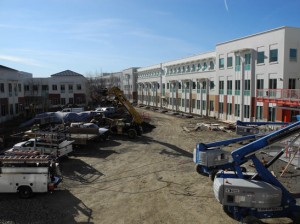This post appeared in the San Jose Mercury News on January 2, 2012
by Larry Magid

As I sat down to write my “2012 tech predictions” column, I recalled a visit last week to Facebook’s new offices in Menlo Park, which may herald a business trend in the new year and beyond.
What impressed me — besides the cafeteria and fabulous employee gym to work off all that free food — is how the company is allowing workers to organize their own work and meeting space. In a sense, the offices are a bit like the company’s flagship social network.
Facebook provides the infrastructure to make things happen, but doesn’t dictate exactly where and when.
That’s up to the “users.” And when it comes to collaboration, the atmosphere is both open and social.
It might be stretching the analogy to suggest that Facebook employees are encouraged to “share” by default.
But they don’t generally work in cubicles and even the executives don’t have walled-off offices. Instead, as you walk through the various buildings on the campus that used to house Sun Microsystems, you see lots of spaces where people can sit — or stand — to do their work or conduct their meetings.
There are glass-enclosed conference rooms, including some that still have the Sun logo on the glass — one of the few reminders of the campus’ former occupant.
But there are plenty of other “spaces” to work, including small and large tables and spaces under stairways where workers can stand up to take a call or read an email on their phone or tablet or conduct an impromptu meeting with fellow employees.
The Facebook campus is very much a work in progress.
There are still plenty of hard-hat-only areas where construction workers are erecting bridges between buildings, turning paved areas into grassy outdoor gathering places and otherwise sprucing up and modernizing the facilities.
Unlike the Googleplex in Mountain View, it doesn’t yet have that college campus-like feeling. I’m told that at least one outdoor area will eventually resemble downtown Palo Alto — the scene of Facebook’s original office.
What Facebook and Google offices do have in common is that sense of openness and the constant mixture of work and play.
It’s become a Silicon Valley tradition to offer on-site distractions, ranging from foosball tables to volleyball courts, and to give employees maximum flexibility as to how they use their time.
There is a rush hour at these companies when many employees arrive in the morning and leave in the early evening.
But there are plenty of people working long and odd hours because — as any aware manager should know — creativity doesn’t always strike between 9 and 5. And, by offering food, exercise and other amenities, companies like Google and Facebook encourage employees to hang around.
Sure, I’ve seen Google employees “waste time” by playing impromptu soccer games on the company’s parklike lawns. But when the game’s over, they’re back at work within minutes and — who knows — there may very well be some creative work getting done in their heads as they play.
I’m a firm believer that flexibility can lead to creativity and productivity. I started writing this column at 5:30 on a Thursday morning because that’s when I’m at my best when it comes to conjuring up ideas. And — truth be told — it’s also a few hours before my deadline. Procrastination aside, that rush to produce before an impending deadline forces me to focus and — in my humble opinion — improves my writing.
I have an office at home, which I use a lot, but at the moment, I’m plopped in front of my kitchen table. I sometimes write from a local coffee shop and I’ve been known to start, finish and file a column on a cross-country flight, thanks to Gogo Inflight that provides Wi-Fi service on Virgin America, American, Delta and some other airlines.
Being able to access the Internet from 35,000 feet takes cloud computing to a whole new level.
The technology that makes this all possible is not only getting better, but getting even more portable.
When I visit Silicon Valley companies, I often notice employees walking around with their laptops and, increasingly, tablets. It’s not uncommon to see a Googler or Facebook staffer walking down a hall and peeking at an open MacBook or ThinkPad to consult the cloud-based company calendar to find out what meeting room they’re headed for.
And when they arrive, there are plenty of electrical outlets to power laptops.
There are even preinstalled power adapters for the most popular laptops. I’ve seen a few people carrying iPads or Android tablets and I expect that trend to grow over time.
Unlike a notebook PC, a tablet works great when you’re standing up walking between meetings.
So my optimistic prediction for 2012 is that we’re going to see some fundamental changes in the way companies organize their employees work environment.
Work will become more flexible, more adaptable and, for companies that implement it correctly, more profitable.

Be the first to comment